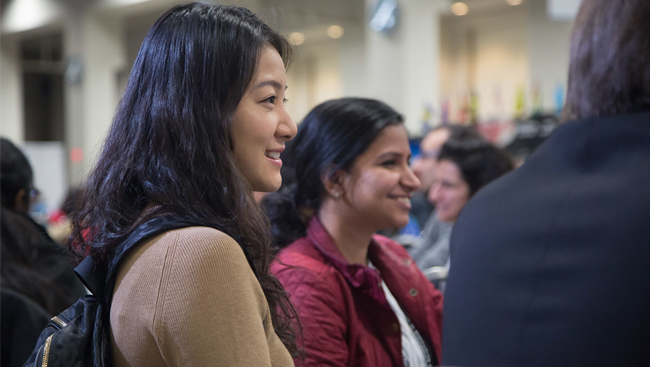This resource was featured in the NeuroJobs Career Center. Visit today to search the world’s largest source of neuroscience opportunities.
Linda Porrino, a department chair at Wake Forest School of Medicine, reflects on what she looks for when hiring new faculty. If you’re considering an academic career now or in the future, read her advice on how to gain experience as a student, make a good impression in the interview, negotiate for what you need, and more.
Click on each question to reveal her perspectives.
1. What type of experience can help me prepare for an academic career?
If you’re a student or postdoc, orient yourself to a place that allows you to gain broad experience and offers you lots of opportunities.
It's important to collaborate with people in multiple labs. I always try to get my students to do a project in my lab, and then a project with another lab so they get more exposure.
Having the experience of writing and getting grants is also beneficial. Having a student, postdoctoral fellowship, or K award, for example, is important because it shows you already have a proven track record for getting grants and are working in current and interesting areas.
Depending on what area of neuroscience interests you, taking teaching courses or gaining outside teaching experience is valuable. In the medical arena of neuroscience, opportunities for teaching are much less. But, if you want to work in a psychology or neuroscience department, having some teaching experience is beneficial because you’ll definitely be teaching.
Developing a peer network can also help. In fact, it’s absolutely critical. I can't stress that enough. Attending meetings and conferences or getting involved with your institution or a professional society gives you opportunities to build connections and see what other careers are available.
2. How can I build my resume?
Giving presentations at meetings, being a student member of societies, and having travel awards strengthen your record. Your extracurricular involvement show you're competitive. Outreach activities are important, too. People who do outreach are typically good teachers who are well spoken and have an interest in mentoring and advocacy.
It’s important to remember, though, you're hired for your science. You're not hired for these other activities. If I see an application with a lot of outreach but no grants, it doesn’t move past the first step.
3. How do I choose a research environment?
I advise students to evaluate the types of environments and situations where they feel most comfortable. For example, did you go to a small liberal arts college as an undergrad and love that environment? Explore those possibilities.
Trying a postdoc in an environment you’re curious about can also help you see if it’s a good fit. Being a postdoc is one of the most wonderful stages of your career because you can focus on figuring out your scientific future.
Remember, postdocs aren’t forever. You can move on and do something different.
4. What should I include in my personal statement, especially if I’ve changed directions?
Whatever your situation, show how you used what you learned to further yourself in your personal statement.
If you’ve done multiple postdocs, or stayed in one position for a long time, address it. Share how each of your student or postdoc opportunities impacted where you are scientifically.
One example of what you could write could be, "My mentor lost funding, so I moved to a new lab. There, I developed a new direction. Now, I’m combining what I learned in both postdocs to build my scientific approach."
There are all kinds of reasons for moving around, including family, career choices, and fit. You should be honest about that, too, and say, “This wasn’t the direction I wanted.”
5. What can I do to ace the interview?
When you interview, it’s most important to know what your interviewer is currently doing, and what they've done in the past.
When I’m interviewing someone for a faculty position, I want to know what they’ll bring intellectually to the environment and how they’ll fit.
To make that case for yourself, you need to know what everybody in the lab does. Show how you fit. Rather than saying, "I read your last paper, and here’s what I think," say, "I’m interested in your approach because it would really enhance my research. Here’s my approach and why I think it would help your research."
Also, if you have the opportunity to interview somewhere you think isn’t the right place for you, go anyway. You can learn about the types of questions people ask, and through practice, feel more comfortable talking about your skills and goals.
6. What should I negotiate for — and how?
It’s really important to negotiate. Everybody typically focuses on salary, but also negotiate for resources, teaching responsibilities, and space. Clarify what's in your offer and the expectations for you to succeed and move up.
My biggest tip is: Every time you ask for something, offer something in return. For example, you could say, "If you pay me an extra $10,000 a year, I'll cover half of that on my grant." It’s harder for someone to say no when they're getting something in return.
7. How can I stay encouraged throughout the application process?
Remember, you only need one job. That's it. In other words, keep trying. Don’t be discouraged. You’ll eventually find a job that’s the right fit for you.
Speaker
Linda Porrino, PhD
Linda Porrino is the chair of the physiology and pharmacology department at Wake Forest School of Medicine. She received her PhD at New York University in experimental psychology and completed postdocs at the National Institutes of Mental Health with Patricia Goldman and Lou Sokoloff.




.png?h=1763&w=3125&la=en&hash=B2439C2768576BED6405672E5CD5CF8CB1AA375F)




